FUCK ART, LET’S SANITIZE: An Interview with Terminal A.
Cleanliness falls into the “selective memory” bracket here at The Last Estate; therefore, it stays off our chore list. Since we’ve long gone beyond intimacy, we never look each other in the eye. This is out of respect for our roommates, as we’ve established an I don’t see you, you don’t see me commitment to privacy — otherwise, we run the risk of lowering our gaze into the absolute pigsty beneath one another. Instead, we choose to feel the chaos, since we have become the mess; the neglect to gain that perspective, where one acknowledges clutter or unsanitary conditions. Until we have picked one of us to blame for some larger crime — then, we save it for further evidence against the pariah du jour on that particular judgment night. We don’t pick our battles here: we merely preserve our ammunition. We must ration in these times of war and plague, these times of art or death, because we never know how the roulette will delegate nature as our one true authority, sentencing us to consequence like we never imagined. The Lord giveth resource, The Lord taketh away.
In rare instances, nature tries giving us a break; blessings in disguise, prompts to explore our larger panorama. When the pandemic ground nearly everything to a halt, artists whose revenue relied on the public stage were among the hardest hit. Yet, we could argue, artists lucky enough to make money from their art are in a fortuitous position of privilege; so while their livelihoods would be wasted by plague, they’d still breathe at the end of the day — merely their identity and ego killed, not their precious life.
But many bands held onto their ego, in a cringing, contrarian death-grip; insisting we watch them on the internet in monetized streams since they knew no other way to adapt to the cultural uncertainty. As a result, most resembled fools playing out an insulting minstrel show, embodied cognitive dissonance, rocking out while the population perished.
Granted, as a musician, I felt that existential fog; one day an exalted God on stage, the next day, rudderless — God forbid(den), suddenly I’m just a person? How dare nature challenge us, to question what it all means. But my shift of consciousness yielded unexpected epiphany: because of these live music streams, between all their semi-subliminal guilt-trip complaining, musicians suddenly became annoying, even archaic to me. I found myself slowly but surely walking backwards in sabbatical from the community, shivering from indie-rock’s self-righteous desperation.

Yet, I was inspired by one pandemic-adaptive story from Terminal A, the two-piece electro-punk band from San Pedro, CA who traded their drum machine, microphone, and guitar for Hazmat suits, mops, and sanitizing sprays; becoming biohazard/death-scene cleaners to stay afloat in the pestilence.
While it would take me two years to reconnect with them, I knew a piece on Colin and Lee’s post-music occupational hazards was essential; to set the record straight in case anyone assumed it was some kind of attention-seeking performance art from the theatrical group. Make no mistake: Terminal A is among the only class-conscious artists out there, unafraid to rub their face in our refuse in true proletariat spirit; while others, still breathing, refusing to get dirty, assume the right to scream why me?
All answers are joint statements unless otherwise noted.
What prompted you, or attracted you, to such an extreme job. Was it the pandemic’s downtime of no live music, something to replace that loss of adrenaline and intimacy? The desire to be charitable in a way? The primal urge to embrace sacrifice? Survivor’s guilt from the pandemic’s unforgiving scythe?
We started working for the bio-hazard company about two months into the lockdown, through a good friend and former coworker of ours. Prior to COVID, we were both working overtime at our jobs saving up 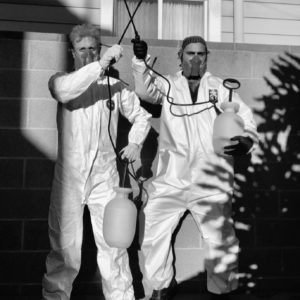 for a two-month European tour that was supposed to begin in April. Once the pandemic hit, the tour was canceled, and we were both out of work. With what little money we had tied up in now-unusable plane tickets, and hitting various bureaucratic blocks with our unemployment filings, we found ourselves in pretty dire straits. Though it was interesting doing a job that mattered, and there was a moment of edification in doing so, it was mostly out of fear and financial desperation that we joined up.
for a two-month European tour that was supposed to begin in April. Once the pandemic hit, the tour was canceled, and we were both out of work. With what little money we had tied up in now-unusable plane tickets, and hitting various bureaucratic blocks with our unemployment filings, we found ourselves in pretty dire straits. Though it was interesting doing a job that mattered, and there was a moment of edification in doing so, it was mostly out of fear and financial desperation that we joined up.
How did you assume you’d have the emotional constitution for such a job or do you/did you? Do you feel mentally fucked up from the experience, or feel like you can face anything now? What kind of person does it take to assume this role?
It’s funny, the question of emotional fortitude never really crossed our minds. Being so behind the eight ![]() ball, saying yes to the work was just a knee-jerk reaction. Consent in a socio-economic sense is kind of a luxury. Concepts like qualification, emotional/physical fitness for the job, didn’t really factor into our thinking. Like most of our past work situations, you say yes and figure out how you’re going to manage to pull it off once you get to the job site. There’s really no other choice.
ball, saying yes to the work was just a knee-jerk reaction. Consent in a socio-economic sense is kind of a luxury. Concepts like qualification, emotional/physical fitness for the job, didn’t really factor into our thinking. Like most of our past work situations, you say yes and figure out how you’re going to manage to pull it off once you get to the job site. There’s really no other choice.
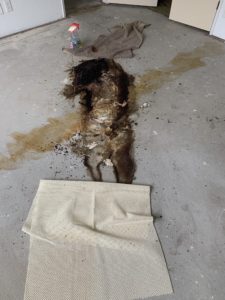 How much work do you bring home with you? In other words, are you able to compartmentalize, or do these scenes and experiences seep into your dreams/subconscious?
How much work do you bring home with you? In other words, are you able to compartmentalize, or do these scenes and experiences seep into your dreams/subconscious?
There’s no way to compartmentalize this kind of work fully. To be around such sites does shift your way of thinking entirely, which we’ll address in all of its overtones in question number 8.
What are some of the easiest scenarios you’ve had to clean, and the hardest?
For us, cleaning and sanitizing COVID outbreak sites was by far the easiest, but not without its own challenges. There was something unsettling about being at war with an invisible enemy, and the speed at![]()
![]()
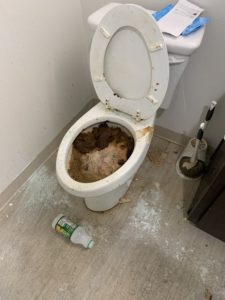 which the information about said enemy was changing at that point in time. These were still the early days of COVID, and worksite protocol would change sometimes twice in a day due to CDC updates. The unattended death sites were of course the hardest, but apart from those the most difficult were the hoarder houses because you were in a site that was a mirror of a damaged psyche, as well as the massive scale of some of those jobs. Some took weeks of a full crew working almost around the clock. ALL these places come with smells.
which the information about said enemy was changing at that point in time. These were still the early days of COVID, and worksite protocol would change sometimes twice in a day due to CDC updates. The unattended death sites were of course the hardest, but apart from those the most difficult were the hoarder houses because you were in a site that was a mirror of a damaged psyche, as well as the massive scale of some of those jobs. Some took weeks of a full crew working almost around the clock. ALL these places come with smells.
How has the job affected your cleaning/hygiene habits at home?
Not in the slightest haha!
Did the job ever have an impact on your dating life, a diminishing of the libido? An existential view on mating for life, a crisis of permanence?
Colin: There were no romantic endeavors for me during this period, but I did cut quite a few friendships. I realized that work put me in a situation where my relationship to my own time was non-negotiable and that people who don’t respect your time have a more negotiable relationship to time itself. More and more I believe this relationship is class-based.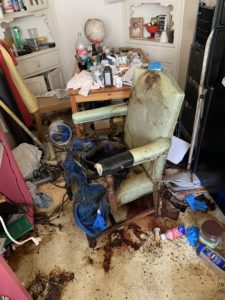
Lee: My dating life and libido were pretty well dead and buried long before this job, but if that hadn’t been the case I’m sure this would have brought me there. I’ve always had a complicated relationship to concepts like mating or romantic permanence, and have always been pretty repulsed by the human body in general. But I will say that seeing a fully nude woman with two prosthetic legs intentionally defecate in the middle of her apartment while making unbroken eye contact with me on one of our hoarder jobs didn’t do much to help.
Have you ever found pets of the deceased at the scene, or worse, a Mary Prevost scenario?
No, thankfully we never encountered pets on the job site. There was one SRO apartment that had about 2 ½ inches of dried dog feces covering the entire floor, including the bathroom, but, alas, no dog.
Has being on the front lines of death given any indication that human life is being incrementally devalued, even from the view of the deceased individual?
No, the fact that the end is so gross, undramatic, and underwhelming makes life and all its grandeur actually more valuable. To think I will be a putrid stain washed away by someone who cares not for my existence makes me cherish the sparse moments of agency all the more.
Post-script:
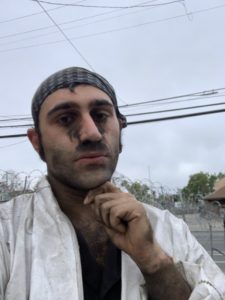 Earlier this week I received a text from Colin, apologizing their part of the interview was taking longer than expected. In an effort to explain, he wrote of a blossoming theory that chilled me to the bone:
Earlier this week I received a text from Colin, apologizing their part of the interview was taking longer than expected. In an effort to explain, he wrote of a blossoming theory that chilled me to the bone:
“I just want to be careful in addressing the questions, because through that process, what Lee and I discovered was a lesson in class-consciousness: working people have a different relationship to time, to their bodies, and virtually no relationship to the idea of consent. These are points we really want to communicate clearly with this interview.”
This intrigued me instantly — I assumed Colin was referring to revelations of viewing the deceased, those who perished in fatal patterns of self-neglect, of addiction pushed to their limits, possibly confirming my own quantum theories of “living fast.”
But after asking him to elaborate on this point, it turns out he was referring to Lee and himself, the desperate automaton working-class walking dead, something immediately relatable to me; therefore, far more disturbing. He texted back in voice message to dive deeper into this theory — I felt his vocal tone was important for these first-hand reports, so we’ve presented them here, unedited.
